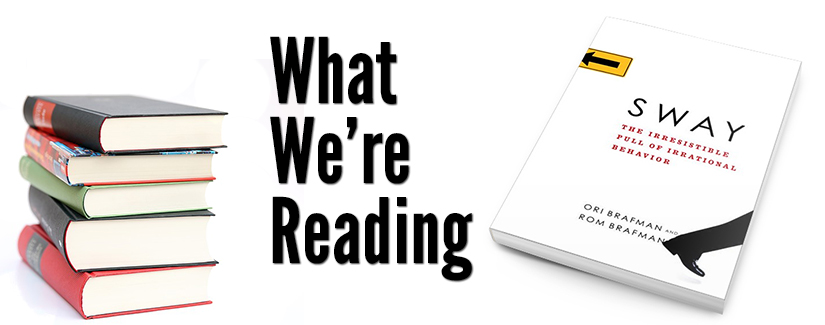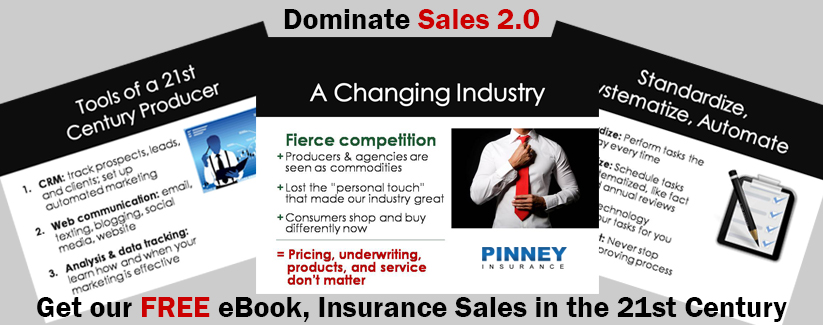
If you’ve ever wondered why you do some of the things you do, “Sway: The Irresistible Pull of Irrational Behavior” can help you answer those questions. It’s all about the psychological influences that act on you, influencing each decision you make. These influences are behind decisions that’s just don’t seem logical – the authors use examples like staying in a bad relationship, entering a bidding war for something less valuable than the prices being bid, or being unable to sell a stock that’s already lost most of its value.
Why do people in those situations sometimes do the opposite of what you’d expect?
Anatomy of a Decision
The authors identify four factors that influence our decision-making process:
- Loss aversion. This is an incredibly powerful force that can drive people to change their behavior. Marketing campaigns that run for a limited time are based on this principle. If you don’t act now, you’ll lose something, and the fear of that loss will move you to action.
- Commitment. People who commit to an idea and stick with it, even when it seems like that idea will never come to fruition, are often called “stubborn.” They’re experiencing a type of loss aversion, though – the loss of all the time and effort they’ve poured into their idea.
- Value attribution/diagnosis bias. Once humans label a person or thing with their initial value judgment, it’s hard to get past that. That initial gut-level reaction can keep people from re-evaluating and judging a person or thing based on hard evidence. One attention-getting example the authors use is of emergency room doctors who turned away a woman who said her daughter was having stomach pains…because the woman seemed like the type of parent who would overreact.
- Group dynamics. Can one powerful, dissenting voice sway others to do things they wouldn’t normally do? You bet. That dissenting voice is actually necessary because it prompts discussion where more people can share their views. When people share their views, they feel more fairly treated and more positive about the situation's outcome.
What Does This Mean for Life Insurance Agents?
…when it comes to fairness, it’s the process, not the outcome, that causes us to react irrationally.
In the world of sales, we use psychology every day. We listen to a prospect's objections and we have to know the best way to try to overcome them. Loss aversion is an extremely powerful play to use, but your prospect has to feel an aversion to that loss on behalf of their family, not themselves.
Something else interesting to come out of this book is the discovery that many people care more about how they’re treated – the perception of fairness – than they do about the quality of the product they’re being sold. If people feel they’re being treated fairly and their voices are heard, they're happy with the transaction. The authors used the example of car dealers, who when surveyed, said they cared more about whether car manufacturers were polite and took the time to learn how they do business. This mattered more than the quality of the cars they got from that manufacturer, or whether they’d overpaid for those cars. These results were repeated with groups as varied as convicted felons and venture capitalists.
...when it comes to psychological undercurrents, the best way to counter them isn’t necessarily to follow our natural instincts.
As life insurance agents, we can use this information.
Now, we’re not suggesting anyone out there recommend or deliver subpar products—far from it. Instead, we should understand that being treated with respect and fairness can have a huge effect on how the consumer views our product. A client who felt treated unfairly might be more likely to surrender their new policy, in other words. A client who felt treated fairly might be more likely to keep a policy, even if they had temporary doubts about the cost or their need for coverage.
As you’re interacting with prospects, ask yourself whether you’re giving them the chance to speak. Then ask yourself if you’re providing real answers, not a sales pitch. Both of those things will make that prospect feel like they’ve been treated more than just fairly.
What Does This Mean for Personal Growth?
When things go wrong, we can either apply a short-term Band-Aid solution or remember that in the grand scheme of things it’s only a minor misstep. Having a long-term plan — and not casting it aside — is the key to dealing with our fear of loss.
If you find yourself in a stressful situation, you can use your knowledge of the four factors listed above to try and resolve that situation. In the book's epilogue, the authors focus on a key source of stress: evaluating short-term outcomes instead of long-term goals.
One example they used was of a friend who got angry when she was held up at a stoplight by a car that wouldn't budge when the light turned green. She was about to veer into traffic to get around that car when she realized what she was doing. She was trying to regain a few lost seconds by doing something dangerous and taking her life in her hands. Those few lost seconds are a short-term outcome that shouldn't influence her overall decision-making process. Once she thought about the long-term outcome - arriving somewhere safely - it was easier to calm down, wait for the car in front to move, and avoid risking an accident.
If you find yourself stressed out by your job, a family situation, or just day-to-day annoyances, stop and think about the four "sways":
- Are you more worried about losing something than gaining something?
- Are you more worried about losing time than about completing a sale or project?
- Are you making decisions based on opinions and impressions or objective data?
- Are you communicating with everyone involved in the decision-making process?
- Are you focusing on short-term benefits or a long-term plan?
If you give yourself the time and space to answer these questions, chances are your stressful situation will become a logical problem you can solve objectively.
Find out more about what it takes to become a 21st Century Producer in our free eBook:

